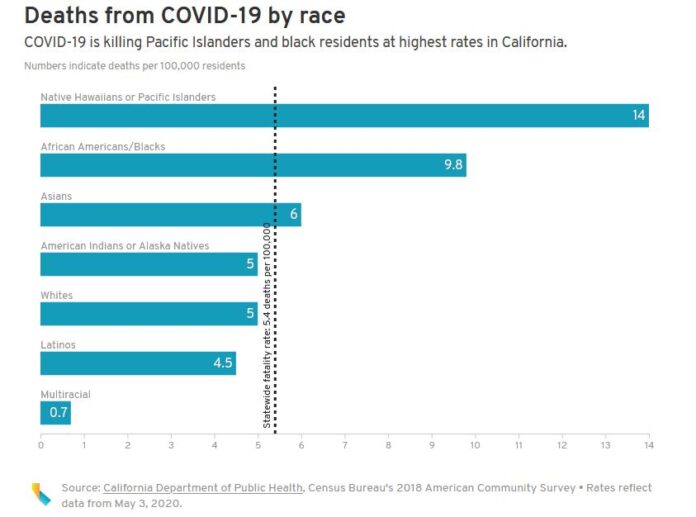Source: California Dept of Public Health and 2018 American Community Survey. Rates from May 3, 2020
Pacific Islanders are dying from COVID-19 at the highest rate out of all ethnic groups in California — but despite the rising infection rate and death toll, community leaders are paving the way for their people’s safety, reported LAist.
The coronavirus outbreak has disproportionately affected low-income people of color, highlighting the inadequacies of the healthcare system along race and class lines.
The Pacific Islander community is no exception. According to CalMatters, the virus has infected Pacific Islanders at over double the rate than that of the rest of California.
According to data from the California Department of Public Health and the LA County Department of Public Health, LAist found that the death rate for Pacific Islanders in LA County is 12 times higher than for Whites, 9 times higher than for Asians, 7 times higher than for Latinx people, and 5 times higher than for African Americans.
These alarmingly high statistics can be attributed to the community’s lack of access to healthcare, poor socioeconomic conditions, and underlying health conditions.
“The pandemic is unmasking the current conditions of poor health access and lower socioeconomic conditions,” Dr. Raynald Samoa, an endocrinologist leading the national coronavirus response team for Pacific Islanders, said in an interview with LAist.
Samoa said that many Pacific Islanders have underlying conditions that make them more susceptible, including diabetes, cancer, and hypertension.
According to the National Center for Biotechnology Information, 54% of Hawaiians, 57% of Samoans, 51% of Tongans, 59% of Guamanians, and 68% of Fijians are currently living in poverty.
Because of this, many of these underlying health conditions go untreated due to poor healthcare, making Pacific Islanders particularly vulnerable to COVID-19.
According to Samoa, many Pacific Islanders are also unable to get access to testing kits due to poverty. They are also more exposed to the virus than other groups because many work in essential fields such as food service and airport security.
Another major issue is that Pacific Islander cultures strongly value family and community, and many live in large, multi-generational households that make it increasingly difficult to contain the spread of the virus.
“To ask a family member to quarantine themselves, to leave them during times of illness, is one of the least Pacific things to do,” Samoa said. “Families have had to move their relatives to a motel. And it was crushing for them.”
Community leaders also fear that statistics do not represent the reality of the issue for Pacific Islanders. Because Pacific Islanders are often lumped under the category of Asian American in censuses and surveys, many of their issues are swept under the rug.
Kawen Young, executive director for the Native Hawaiian and Pacific Islander Alliance in Gardena and member of the coronavirus response team, said that they are pressing public health officials to disaggregate COVID-19 data in order to accurately collect and portray information on Pacific Islanders in an interview with the LAist.
“We are doing what we are doing to make sure our numbers are being shown, to make sure we’re counted,” Young said.
In order to address these issues, community leaders are promoting social distancing, counseling the sick, and boosting morale.
Pausa Thompson, head pastor of the Dominguez Samoan Congregational Christian Church, has already offered his church to be used as a testing site. He is also speaking out on unhealthy habits that lead to chronic health conditions within Pacific Islander communities.
Meanwhile, Samoa and the national response team are working hard to both combat the spread of the virus and unearth racial inequities and healthcare disparities.
Despite his efforts to stay healthy, Samoa was diagnosed with COVID-19 in March and has made a full recovery. He shared his journey on social media in order to help undo the fear and stigma surrounding the disease.
“I’m somewhat introverted, so I don’t like to share details of my personal health,” Samoa said. “But I think it was important, especially with my community to show people that this was not a hoax. This is real.”
AsAmNews has Asian America in its heart. We’re an all-volunteer effort of dedicated staff and interns. Check out our new Instagram account. Go to our Twitter feed and Facebook page for more content. Please consider interning, joining our staff, or submitting a story.


